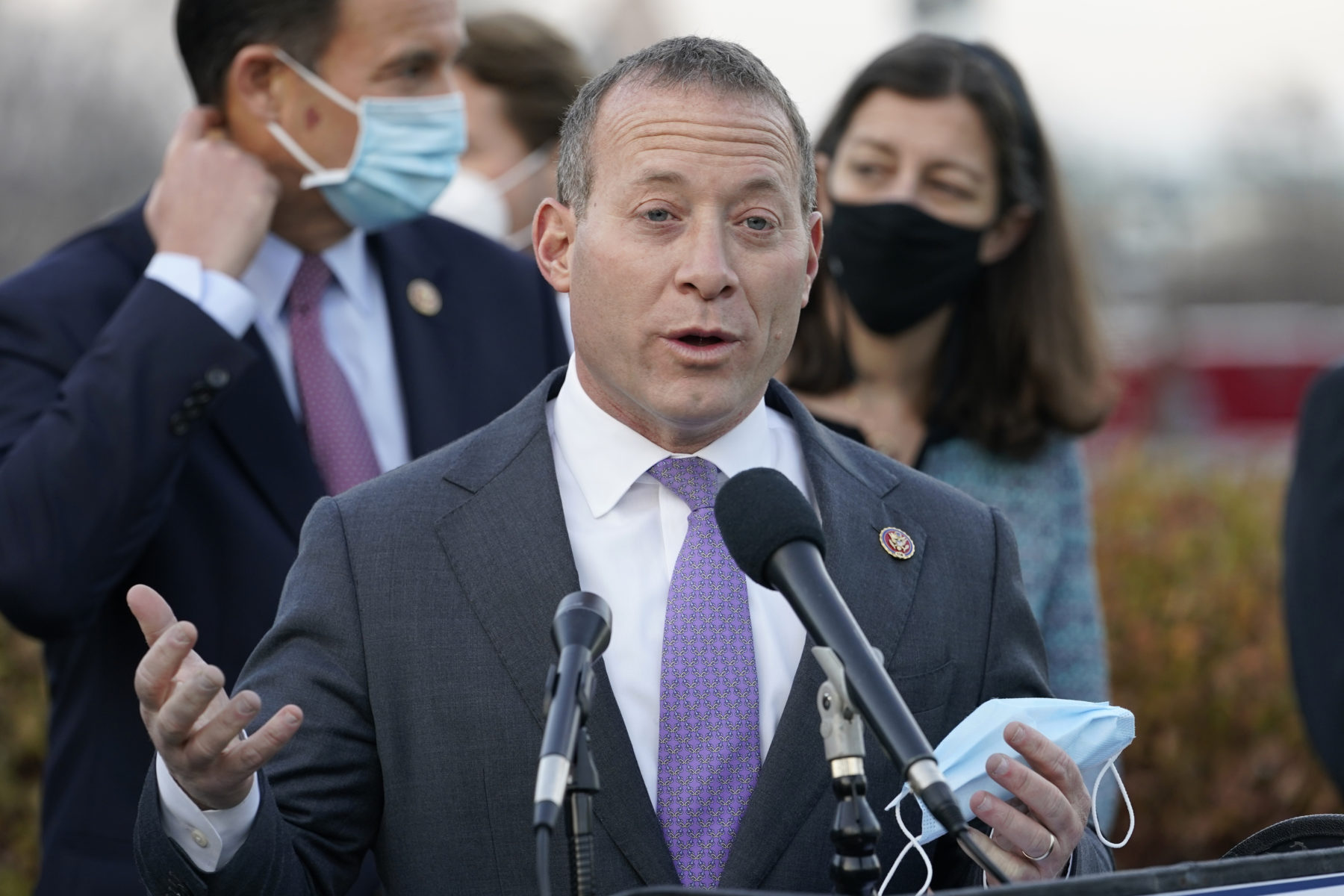
Deficit Fears Have Deep History in Corporate-Funded Democratic Party Groups
The Democrats threatening to block passage of their party’s agenda in Congress generally claim it comes down to concerns over government spending. Their rationales seem to share the idea that slight increases in certain types of spending over 10 years would be too high.
Democrats are frustrated not only because many of the policies that might be blocked by over a dozen of their House members are remarkably popular, but also because the Biden administration has a window of less than a year from now to pass major legislation before the midterm elections take up virtually all political oxygen—as well as the very likely prospect of gerrymandering giving Republicans House control in the midterm elections.
For the past couple months, centrist senators Joe Manchin and Kyrsten Sinema have simply declared that $3.5 trillion in gross spending over 10 years is unconscionable, seeking to depress and delay the package while raising campaign money from the bill’s opponents. Even after House Democratic leaders put $2.9 trillion in revenue on the table for the reconciliation package, bringing down the potential net costs of the bill to a mere $60 billion a year, or one percent of next year’s budget, members of the conservative House Blue Dog Coalition clamored for a review of the plan’s spending levels and revenue raisers in attempts to block its passage.
Party elites like John Podesta weighed in last week to urge congressional leaders to further scale back the bill’s top-line spending numbers, even though the plan already represented a significant compromise with the White House and the progressive wing. Heading into what might be a climactic week on Capitol Hill for the Biden administration’s “Build Back Better” agenda, Democrats are staring down a repeat of the grinding first year under President Obama.
Democratic Party faithful should not be surprised by the bad-faith deficit arguments and process roadblocks thrown up by the conservative wing. The throwback budgeting ideas cited this month by big business favorite Kyrsten Sinema and Blue Dog leader Kurt Schrader have long been cultivated by people who hold leadership positions in the Democratic Party. Corporate interests have used party-affiliated groups to promote centrist politicians like Blue Dog Josh Gottheimer who are willing to provide cover for austerity policies.
The groups include the following: Fix The Debt, a “deficit hawk” project of the Committee for a Responsible Federal Budget (CRFB), whose bipartisan leadership had extensive undisclosed corporate lobbying ties; Third Way, a centrist think tank funded by corporations including PG&E and defense contractor United Technologies; and the bipartisan Problem Solvers Caucus, founded by the “dark money” group No Labels, which is funded by power-player financiers and Republican megadonors.
Often led by former Democratic officeholders, these groups push for reduced outlays on social programs and climate resilience, but rarely on military budgets or industry subsidies. Their anti-tax talking points and “fiscal hero” award series are cited by Democrats, who in turn spend to promote their “fiscally-responsible,” “commonsense solutions,” which get described as “moderate” in the mainstream media. The Blue Dog Coalition counts 19 members among 220 House Democrats; there are 28 Democrats in the Problem Solvers Caucus, including seven new members in this Congress. Third Way’s honorary co-chairs include Manchin, Sinema, and four more Democratic senators, as well as several members of House Democratic leadership, including Majority Whip Clyburn, former DCCC chair Cheri Bustos, and corporate-backed Reps. Scott Peters, Kathleen Rice, and Josh Gottheimer, to name a few.
On Sept. 14, Rice teamed up with top pharma industry cash recipient Peters and Blue Dog PAC chair Kurt Schrader to vote against drug pricing reforms in the House Energy and Commerce Committee. In a constituent letter, Rice claimed that the reconciliation plan won’t become law, even though she voted for virtually every other provision in the package this month. Rice went on to claim that her vote against drug pricing reform—which she acknowledged voting for in H.R. 3, in the previous Congress—was rooted this time in “fiscal responsibility,” and claimed to be joining an alternative plan to reduce prescription drug prices. But the Congressional Budget Office found that the measure would generate huge revenue for the Democratic spending plan, saving Medicare $456 billion over 10 years. It’s also exceedingly popular, supported by nearly nine in 10 people in a May poll of over 1,500 adults.
Exerting pressure on the Senate side, Joe Manchin and Kyrsten Sinema have raised concerns over the Democratic plan’s top-line spending number. Manchin claimed on a Sunday show earlier this month that there’s not an urgency to the budget process. Manchin, the former ALEC state chairperson, threw out $1.5 trillion as a spending number that he would be able to contemplate, which like $3.5 trillion is a tiny fraction of the $288 trillion in projected cumulative GDP over the next decade. Sinema, whose chief of staff is a former pharma lobbyist and who in just the current election cycle has received almost $400,000 in contributions from the pharmaceutical industry according to OpenSecrets, told the White House she opposed the drug price negotiation provisions. Reporter Andrew Perez recently highlighted how Sinema controls her role in the spending-slashing process by doling out tidbits to Beltway media without answering direct questions from reporters or her constituents.
The resistance among conservative House Democrats has been building: last month, a group of nine mostly Blue Dogs threatened to block the $3.5 trillion reconciliation bill’s passage unless the smaller infrastructure bill was passed first, while the Congressional Progressive Caucus worked to ensure the bills would be passed in tandem. Schrader has touted his concerns over the national debt, and a group led by Gottheimer initially called on Speaker Pelosi for a delay to “review a detailed scope of spending levels of revenue raisers.” With Democrats holding only a four seat margin in the House, and with four reps who voted against drug price reforms in committee, including Blue Dog co-chair Stephanie Murphy in Ways and Means, the whole reconciliation budget package is coming under stress.
This month, a polling project from Data for Progress found that support for Medicare drug negotiations is sky-high in the holdouts’ districts: 91% in Schrader’s, 90% in Gottheimer’s, and 90% in Rice’s. Widespread calls on social media and op-eds wonder what these Democratic members of Congress are doing with their precious and dwindling window of legislative time, if not priming themselves for an industry payday after leaving office.
For Capitol Hill observers, the role of the corporate PAC-reliant House Blue Dogs in the reconciliation plan is reminiscent of the delay and watering-down of the Affordable Care Act during President Obama’s first two years in the White House, objecting to its initial $1.75 trillion price tag. Many Blue Dogs who were defeated in the Republican Tea Party wave of 2010 immediately revolved to lobbying positions on K Street. The influence peddlers included at least three Blue Dogs who voted against the Affordable Care Act: former Reps. Stephanie Herseth Sandlin and Walt Minnick, who were defeated, and John Tanner, who retired. Blue Dog co-founder Bud Cramer didn’t respond to press inquiries in 2009 about his lobbying firm’s claim of “strong working relationships” and influence on Capitol Hill through the coalition. The Blue Dogs took credit for killing a public healthcare option in Obamacare, while pressure on spending from conservative senators like Joe Lieberman pushed premium subsidies lower, driving up the unpopularity of the reform.
Blue Dogs have tended to oppose spending on social programs like those in the Build Back Better Act but not on the military, which gets half of the federal discretionary budget every year. Blue Dog Jim Cooper of Tennessee, the fourth-most senior member of the House Armed Services Committee, last year accepted a “fiscal hero” award from CRFB while he cheered on the creation of the Space Force that military watchdog group POGO has slammed as wasteful. The self-described “budget nerd,” who is also a member of the Budget and House Oversight and Reform committees, was a board member of CRFB in 1998, when he was between stints in Congress, according to tax documents maintained by corporate accountability group LittleSis.
Prominent Democratic leaders of the Fix the Debt campaign, which drove a lot of federal deficit concerns under the Obama administration, had undisclosed ties to powerful corporate interests, according to 2013 research from the nonprofit Center for Media and Democracy. Last year, recipients of the group’s Fiscal Hero award included Blue Dogs Schrader and Murphy, as well as Peters and Rice. Former Blue Dog co-chair Anthony Brindisi and fellow member Dan Lipinski each got recognition from the group, as did current Blue Dog Abigail Spanberger.
Fix the Debt’s co-founder and former Obama deficit commission co-chair Erskine Bowles held lucrative board seats at Morgan Stanley, Facebook, and railroad company Norfolk Southern. Bowles—and Podesta—are members of the Democratic National Convention Rules Committee, which meets every four years around the presidential nominating convention to consider changes to the party Charter and Bylaws. Last year, the approximately 158-member committee, with many appointed by the campaign of the winning presidential campaign, voted down proposals from delegates that would have permanently barred corporate PAC donations and banned corporate lobbyists from serving as DNC members.
Other well-connected Democrats with undisclosed conflicts of interest in Fix the Debt’s PR campaign included former governors Ed Rendell and Phil Bredesen, former senator Sam Nunn, and former representative Vic Fazio.

Earlier this year, centrist group Third Way led a public push for the Biden administration to means-test stimulus checks to address the effects of the coronavirus and nix a $15 minimum wage proposal. The group’s corporate funders in 2019 include methane gas company Entergy, Facebook, Johnson & Johnson, Dow, Pepsi, and International Paper.
The Intercept recently broke the story that the centrist group No Labels, which does not disclose its donors publicly, offered to raise $200,000 for two House Blue Dogs if they would bail on a scheduled fundraiser with Pelosi. In the 2018 election cycle, the group’s PAC made over $3.7 million in outside expenditures, according to OpenSecrets. In the 2020 cycle, its PAC and employees contributed over $208,000 to Democratic candidates, led by donations to Blue Dog Jim Costa and followed by former Blue Dog Brindisi and Max Rose, as well as $10,000 from its PAC to Gottheimer. The Problem Solvers Caucus was recently at the head of a push to repeal a cap on the SALT Tax, which would benefit almost exclusively the 1 percent. Gottheimer is a protege of Mark Penn, the centrist strategist whose wife Nancy Jacobson runs No Labels.
As the Obama administration began its second term in 2013, the New York Times reported that the fiscal deal reached with lawmakers held off on cuts to major Defense contractors like Honeywell, whose CEO, David M. Cote, is among the Fix the Debt co-founders. Honeywell, the top weapons maker stock held by members of Congress in our latest analysis at up to $2.6 million owned, brought in $5.8 billion last year in defense contract revenue.
“It’s easier to get face time in Washington as a deficit hawk than as a corporate hack,” Kevin Connor, the director of the Public Accountability Initiative, told the NYT then, when deficit mania was in full swing. “They are spending millions, but they are protecting billions in defense contracts and tax giveaways that would otherwise be on the chopping block.”
As the conservative Democrats face off with progressives and leadership over the size of the reconciliation package, last week Congress overwhelmingly passed a $768 billion Pentagon budget for fiscal year 2022, twice as large as the annualized spending of the Build Back Better Act. Every Blue Dog voted against an amendment introduced by progressives to cut the Pentagon budget by 10% and in favor of passing the bill, which when passed by the Senate will boost spending by $24 billion above the amount the Biden administration requested.
For more muckraking into un- and under-disclosed conflicts of interest, get the free Sludge newsletter.
